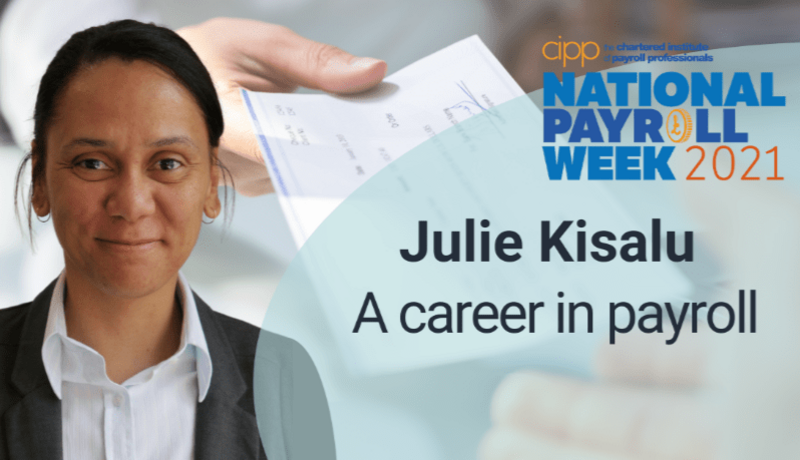A career in payroll | Julie Kisalu
Posted on September 2021

As an “accidental payroller” Julie Kisalu, our Internal Payroll & Data Analysis Manager, has shown what an excellent platform the payroll profession is for growth and career progression.
We discussed her career spanning over 20 years, the changes and challenges she has faced and why payroll is the career for her.
How did you first begin in payroll?
I am an accidental payroller. I wasn’t sure what I wanted to do, so took a job as a data entry clerk for a manufacturing company who were transferring their many years of paperwork onto a computerised stockroom. One of the payroll team was going on maternity leave and I was asked to cover. Back then, it was very manual! Weekly employees had to punch in and out on timecards and we had to add up the hours, work out shift pay, hazard money, productivity bonuses, overtime, sick pay etc and then enter the data into payroll software.
What are the three biggest changes/developments in payroll over time?
One of the biggest changes was HMRC going to RTI (real time information).For many years, employers had to reconcile the tax and NI at the end of the tax year, complete paper forms or send a disk with the information, and now it is done monthly. Before RTI, it could take anything from 4 to 10 weeks for HMRC to sort out a tax code, but now an employer can be notified of a tax code change within days of submitting files to them.
Auto enrolment is another major change – as more people are living longer, we have to make some sort of provision for our old age and this legislation aims to encourage people to start saving early.
The biggest shift though for me is payroll no longer being seen as just another admin function. It plays an important role within companies and there are a lot more courses and qualifications available today that when I first started out.
What characteristics have served you well in this field of work?
A characteristic that serves me well and I take from role to role is respect for confidentiality – payrollers are like the gatekeeper and no one passes without the correct password.
You also must have good numeracy skills – although payroll software does most of the calculations, you need to be able to know how gross to net pay is calculated.
I have also developed what you can call thick skin – people are very passionate when it comes to their pay (rightly so) and can be abrasive, so you need to not let it get to you and just concentrate on resolving the issues.
What is the biggest challenge you have faced in payroll?
Any new payroll legislation is a challenge as the software provider has to modify the product and we, as users, have to ensure it works for how the business operates. A good example is auto enrolment – even though the modifications were made to payroll systems, there were a lot of pension providers out there who wanted the data in different formats, meaning the software companies had to create one specifically for that pension provider.
You have developed your skills to encompass internal payroll and being an integral part of the systems team, what drives to keep learning?
I have a “who, what, why, how” attitude to what I do – e.g. what does the new legislation mean for the business and how will this affect employees, who needs to know what changes are coming, why is this changing (what was the underlying reason for the change) which enables me to constantly grow my knowledge.
What changes do you think will happen in this field in the future.
The future of payroll is in the cloud - more companies are moving towards cloud portals and self-service systems for their employees. There are now cloud smartphone apps that allow employees to access their payslips anytime as well as manage their information online.
What it is that’s kept you in the profession for so long?
I stay in payroll because I have seen how the developments in software and changes in legislation have changed the processing of payroll over the years. I have seen it from when it was very manual and heavily paper based, having to do manual tax calculations to the present when the software does all the calculations and there is hardly any paper. It never stops evolving.
What do you enjoy most about the role?
Getting paid! Seriously, I enjoy working with the people at Venn Group and sometimes have the perverse enjoyment saying no to requests after deadlines. I am also not totally focused on payroll, I am also involved with application support and implementation, which I enjoy. There is nothing like a problem solving to get the blood circulating!
Thank you, Julie for sharing your knowledge and for being so dedicated and hardworking throughout your career.
Recent Articles
-
Case Study | St Catharine's College
St Catherine’s College, University of Cambridge, sought to appoint an Alumni Engagement Manager ...
2 months ago -
Career Pathway Programme for the LLG
As the exclusive recruitment Corporate Partner of Lawyers in Local Government, we are committed t...
2 months ago -
Endometriosis Month | Chloe Bailey - Personal Perspective
For Endometriosis Awareness Month, Chloe Bailey shares her personal perspective on the journey t...
3 months ago